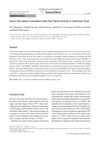 12 citations,
May 2019 in “The journal of pharmacology and experimental therapeutics/The Journal of pharmacology and experimental therapeutics”
12 citations,
May 2019 in “The journal of pharmacology and experimental therapeutics/The Journal of pharmacology and experimental therapeutics” Activating TRPV3 channels stops hair growth by killing hair follicle cells.
 March 2024 in “Journal of Microbiology and Biotechnology”
March 2024 in “Journal of Microbiology and Biotechnology” Phloroglucinol may help improve hair loss by promoting hair growth and reducing oxidative stress.
 147 citations,
April 1994 in “Drug Safety”
147 citations,
April 1994 in “Drug Safety” Some drugs can cause hair loss or increase hair growth, but these effects are usually reversible when the drug is stopped.
 5 citations,
May 2023 in “Frontiers in immunology”
5 citations,
May 2023 in “Frontiers in immunology” Environmental factors like diet and vitamin levels, especially Vitamin D, can affect autoimmune diseases differently, with lifestyle changes potentially improving outcomes.
 December 2023 in “Tuberkuloz ve Toraks/Tüberküloz ve toraks”
December 2023 in “Tuberkuloz ve Toraks/Tüberküloz ve toraks” Many COVID-19 patients have long-term symptoms, especially women, but certain medications may help reduce these symptoms.
 21 citations,
January 2014 in “Dermatology Research and Practice”
21 citations,
January 2014 in “Dermatology Research and Practice” Hair and serum levels of zinc, copper, and iron are similar in people with alopecia areata and healthy individuals.
 5 citations,
January 2001 in “Advances in protein chemistry”
5 citations,
January 2001 in “Advances in protein chemistry” 5α-reductase inhibitors help treat disorders caused by DHT and have potential for future therapies.
 131 citations,
August 2000 in “International Journal of Dermatology”
131 citations,
August 2000 in “International Journal of Dermatology” Inflammation may be linked to hair loss, and targeting specific enzymes could help treat it.
 June 2024 in “Synthetic and systems biotechnology”
June 2024 in “Synthetic and systems biotechnology” A fragment of human type XVII collagen shows great potential for skin health and wound healing.
 15 citations,
November 2023 in “Immunity & ageing”
15 citations,
November 2023 in “Immunity & ageing” TLR4 is important in aging-related diseases and could be a new treatment target.
 November 2023 in “Frontiers in cell and developmental biology”
November 2023 in “Frontiers in cell and developmental biology” Hair aging is caused by stress, hormones, inflammation, and DNA damage affecting hair growth and color.
 185 citations,
August 2020 in “Mayo Clinic Proceedings”
185 citations,
August 2020 in “Mayo Clinic Proceedings” Men are more likely to have severe COVID-19 cases and fatalities than women due to factors like lifestyle, aging, and biological differences.
 January 2000 in “BioScience”
January 2000 in “BioScience” The document concludes that understanding hair biology is key to treating hair disorders, with gene therapy showing potential as a future treatment.
 November 2023 in “International Journal For Multidisciplinary Research”
November 2023 in “International Journal For Multidisciplinary Research” Herbal hair oil made with natural ingredients helps reduce hair loss, dandruff, and graying.
 November 2023 in “bioRxiv (Cold Spring Harbor Laboratory)”
November 2023 in “bioRxiv (Cold Spring Harbor Laboratory)” Disrupted cholesterol production impairs hair follicle stem cells, leading to hair loss.
 19 citations,
December 2021 in “Endocrine Reviews”
19 citations,
December 2021 in “Endocrine Reviews” There are various effective hormone treatments for puberty induction in boys and girls with hypogonadism, and starting treatment early is important.
March 2024 in “International journal of molecular sciences” Meibomian glands are highly specialized and differ significantly from other sebaceous glands in structure and function.

Stress significantly contributes to hair loss, especially in women and those aged 31-40.
 8 citations,
October 2022 in “Regenerative Therapy”
8 citations,
October 2022 in “Regenerative Therapy” New regenerative treatments for hair loss show promise but need more research for confirmation.
 September 2023 in “Çukurova medical journal (Online)/Çukurova medical journal”
September 2023 in “Çukurova medical journal (Online)/Çukurova medical journal” EZH2 levels decrease as fetuses develop and are higher in adult skin, which may affect skin growth and repair.
 10 citations,
June 2016 in “Wound Repair and Regeneration”
10 citations,
June 2016 in “Wound Repair and Regeneration” The microenvironment, especially mechanical forces, plays a crucial role in hair growth and could lead to new treatments for hair loss.
 101 citations,
January 1997 in “Journal of Investigative Dermatology Symposium Proceedings”
101 citations,
January 1997 in “Journal of Investigative Dermatology Symposium Proceedings” Nerves and chemicals in the body can affect hair growth and loss.
 22 citations,
July 2012 in “Journal of integrative agriculture/Journal of Integrative Agriculture”
22 citations,
July 2012 in “Journal of integrative agriculture/Journal of Integrative Agriculture” Hoxc13 is linked to seasonal hair growth in Cashmere goats and is affected by melatonin.
 8 citations,
May 2021 in “Bioengineering & translational medicine”
8 citations,
May 2021 in “Bioengineering & translational medicine” Hair growth environment recreated with challenges; stem cells make successful skin organoids.
 3 citations,
December 2022 in “npj Regenerative Medicine”
3 citations,
December 2022 in “npj Regenerative Medicine” HSPGs help control stem cell behavior, affecting hair growth and offering a target for hair loss treatments.
 2 citations,
February 2022 in “Frontiers in Endocrinology”
2 citations,
February 2022 in “Frontiers in Endocrinology” Antiandrogenic pretreatment for women with PCOS does not improve fertility outcomes and delays pregnancy.
 15 citations,
January 2019 in “International Journal of Women's Dermatology”
15 citations,
January 2019 in “International Journal of Women's Dermatology” Early treatment helps stop hair loss in women of color.
 68 citations,
January 2022 in “International Journal of Molecular Sciences”
68 citations,
January 2022 in “International Journal of Molecular Sciences” PCOS management includes lifestyle changes and medications, with ongoing research into repurposed drugs for better treatment options.
 7 citations,
January 2022 in “Plants”
7 citations,
January 2022 in “Plants” Rice husk and bran extracts from the Bue Bang 3 CMU variety can potentially treat hair loss due to their antioxidant, anti-inflammatory, and anti-androgenic properties.
 2 citations,
November 2023 in “Curēus”
2 citations,
November 2023 in “Curēus” Platelet-rich plasma (PRP) speeds up skin wound healing and has potential in medical and cosmetic uses.




























